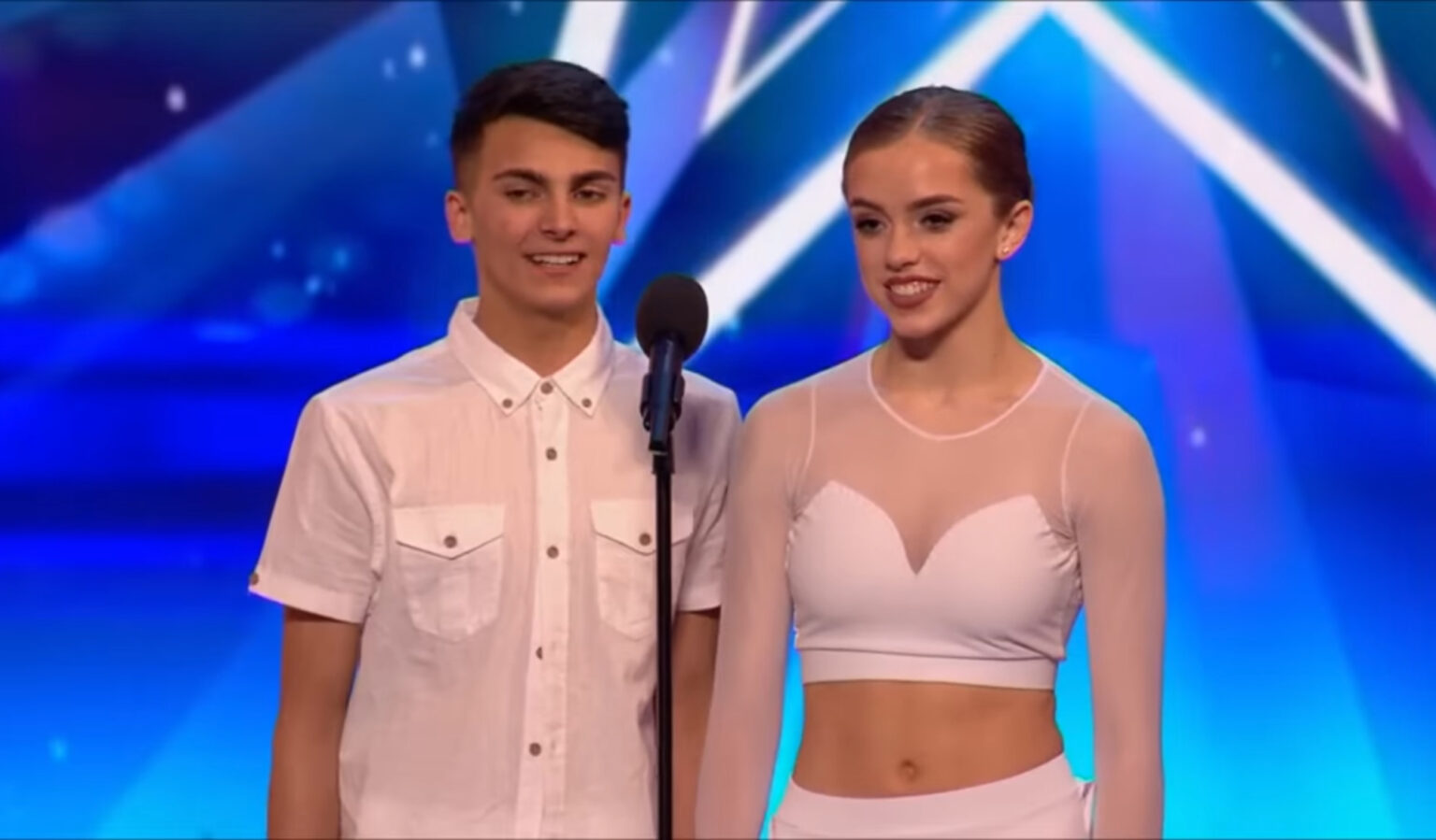Grace had always believed dance was the language of feelings too deep for words. At seventeen, she poured every triumph and heartbreak into her movements, sculpting emotions into choreography the way others wrote in journals. Ali, one year older, was the same. They had met in their college’s performing arts studio—an ordinary Tuesday that shifted both their lives.
She was rehearsing a routine alone, struggling with a sequence of turns that refused to cooperate. He watched from across the room, hesitant at first, then offered to help. What started as a practical correction blossomed into long hours of rehearsals, laughter, and eventually late-night conversations about their dreams. Somewhere between pliés and pirouettes, between falling and catching, love crept in.
But love, they discovered, was harder to choreograph than dance.
The Opportunity
When Britain’s Got Talent announced auditions in their region, Grace was the first to suggest they try.
“Not just to win,” she said, her eyes bright, “but to show them what we are together.”
Ali hesitated. He carried a weight Grace didn’t yet know: his parents disapproved of performing arts. They wanted him to study law, to choose a stable career, not chase what they saw as frivolous dreams. But when he looked at Grace—so certain, so full of light—he couldn’t say no.
They crafted their routine themselves, a contemporary piece that wove together lifts, falls, and breathless moments of stillness. It was both performance and confession: a map of their young romance, sketched in motion.
The Audition
The day of the audition, the theatre was buzzing with nervous energy. Grace adjusted her costume, hands trembling. Ali squeezed her fingers.
“We’ve done harder routines in rehearsal,” he whispered.
“This one’s different,” she said. “This one matters.”
When their names were called, they stepped into the spotlight. For a heartbeat, the judges looked at them skeptically—two teenagers, just another couple with big dreams. Then the music began.
Their bodies moved like echoes of one another. Grace spun, Ali followed. He lifted her high, and for a moment she seemed to hover above the stage, suspended by trust alone. The routine pulsed with intensity: moments of union, moments of separation, mirroring the fragile, thrilling chaos of first love.
The audience was silent, entranced. By the time the music faded, Grace and Ali were both breathless, arms still linked. Then the theatre erupted in applause.
The Judges
David Walliams leaned forward first. “That wasn’t just dance—it was storytelling. I felt every beat of your connection.”
Alesha Dixon nodded, smiling. “Technically, you’re strong. But what really struck me was the emotion. I believed you two. And that’s rare.”
Simon Cowell, harder to impress, gave a small nod. “It was mature, surprisingly so. You’re very young, but you’ve shown us something authentic. That’s the kind of performance people remember.”
All four judges said “yes.” Grace gasped, covering her mouth. Ali grinned despite himself, relief flooding his chest. They had made it through.
The Strain
Fame, however, wasn’t what they expected. Overnight, clips of their audition spread online. Headlines called them “the teenage sweethearts who danced their love.” Messages poured in from strangers, praising them—or questioning if young love could really be so strong.
At first, it was exhilarating. Then the pressure set in. Their next performance had to be bigger, better, more breathtaking. Arguments crept into rehearsals. Grace wanted to push their choreography to new extremes; Ali worried about injury, about failing under the spotlight.
One night, after a particularly heated argument, Grace burst out: “Do you even want this, Ali? Or are you just here for me?”
The silence that followed was heavier than any applause.
The Revelation
Days before the semifinals, Ali finally told her the truth.
“My parents don’t know I’m here. They think I’m in study groups, preparing for law school applications. If they find out…” He trailed off, unable to finish.
Grace stared at him, stunned. “All this time? You’ve been carrying that?”
“I didn’t want to burden you,” he admitted. “But every step we take on that stage feels like I’m defying them. And I’m scared.”
Grace reached for his hand. “Ali, you’re not defying them. You’re choosing yourself. You’re choosing us.”
In that moment, the routine for their semifinal round transformed. It was no longer just about young love. It became about rebellion, about courage, about finding freedom in each other.
The Semifinal
When the night arrived, the stakes were higher than ever. Grace and Ali stepped onto the stage, hearts pounding in sync.
Their routine opened with distance—two figures moving apart, trapped in invisible cages. Then, slowly, their movements intertwined. They broke barriers, lifted one another higher, until the final leap when Grace soared into Ali’s arms, their silhouettes merging against the stage lights.
The audience roared. The judges stood to applaud.
But the most important moment came afterward, when Ali’s parents, who had secretly come to watch, stood up in the crowd. His mother’s eyes glistened. His father’s hands came together in hesitant applause. It wasn’t full approval—but it was a beginning.
The Aftermath
Grace and Ali didn’t win Britain’s Got Talent. Another act claimed the trophy. But the headlines after the finale told a different story: “Teenage Couple Redefines Dance with Authentic Love Story.” Offers to perform poured in—festivals, theatre collaborations, even a documentary proposal.
Back in their college studio, Grace looked at Ali, grinning as she tightened her laces. “So, what now?”
Ali smiled, lighter than he had ever felt. “Now we keep dancing. Not for the judges. Not for the crowd. For us.”
And as the music started again, they moved—not as competitors, but as two people bound by rhythm, by love, and by the unspoken promise that whatever came next, they would face it together, one step at a time.
